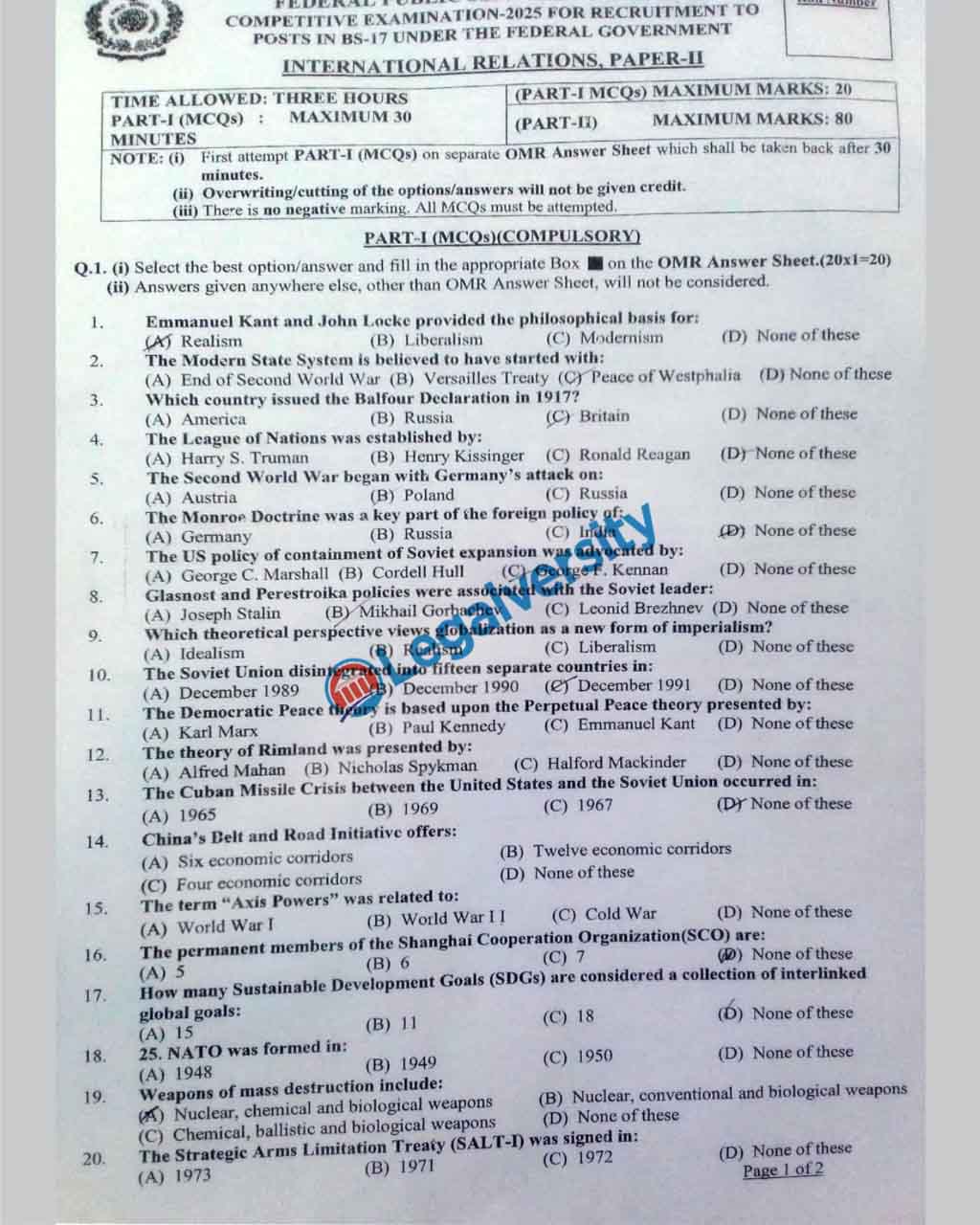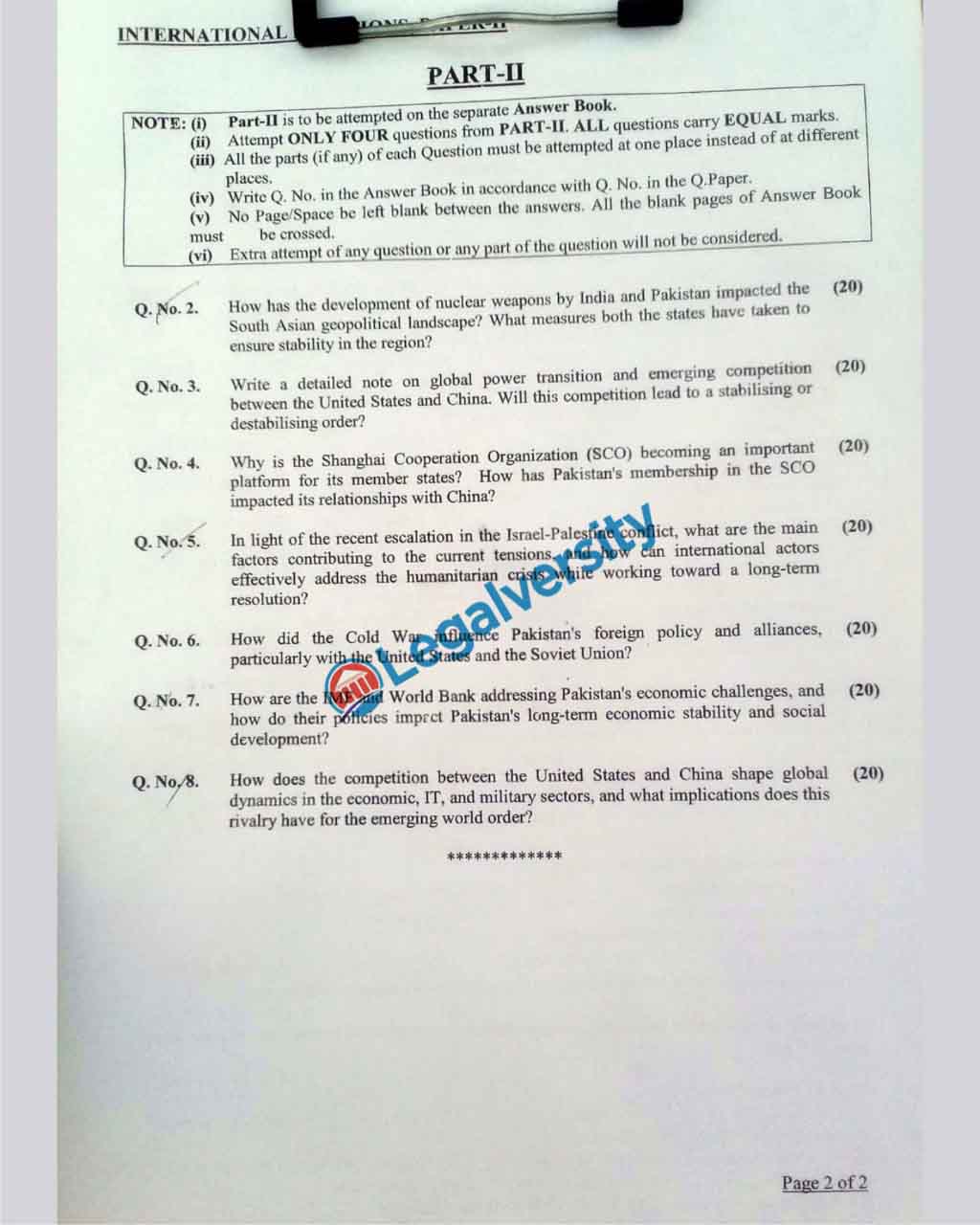International Relations (IR) is an optional subject in the CSS competitive examination 2025. Here, you will find the CSS IR past Paper-II 2025. I will also provide a summary of the paper, in which you will analyze what topics were given and how difficult they were. This lets you better understand the paper and prepare well for future examinations.
CSS International Relations (IR) Past Paper-II 2025
Q1. How has the development of nuclear weapons by India and Pakistan impacted the South Asian geopolitical landscape? What measures both the states have taken to ensure stability in the region?
Q2. Write a detailed note on global power transition and emerging competition between the United States and China. Will this competition lead to a stabilizing or destabilizing order?
Q3. Why is the Shanghai Cooperation Organization (SCO) becoming an important platform for its member states? how has Pakistan’s membership in the SCO impacted its relationships with China?
Q4. In light of the recent escalation in the Israel-Palestine conflict, what are the main factors contributing to the current tensions, and how can international actors effectively address the humanitarian crisis while working toward a long-term resolution?
Q5. How did the Cold War influence Pakistan’s foreign policy and alliances, particularly with the United States and the Soviet Union?
Q6. How are the IMF and World Bank addressing Pakistan’s economic challenges, and how do their policies impact Pakistan’s long-term economic stability and social development?
Q7. How does the competition between the United States and China shape global dynamics in the economic, IT, and military sectors, and what implications does this rivalry have for the emerging world order?
Analysis of the Paper
India and Pakistan’s nuclear arsenals have entirely changed the region’s geopolitical framework. Although the nuclear deterrents have kept super wars at bay, ongoing hostile relations and border tensions keep South Asia in turbulence. Both sides have taken various confidence-building measures (CBMs), set hotlines, and held strategic discussions to avoid such incidents by default. Nevertheless, the arms race and changing military principles remain threats to regional stability.
The global power transition between the U.S. and China is reshaping international politics. China’s economic rise, technological advancements, and military modernization challenge U.S. hegemony. While some argue this competition could create a balance of power, others fear it may lead to global instability, trade wars, and military confrontations. The outcome depends on how both states manage their rivalry through diplomacy, economic interdependence, and military restraint.
The Shanghai Cooperation Organization (SCO) has become increasingly significant as a regional forum for cooperation in security, trade, and geopolitics. For Pakistan, SCO membership has enhanced its relationship with China, providing economic and strategic dividends. It has also allowed Pakistan to interact with Central Asian countries and balance Western diplomatic pressures. Yet, internal issues within the SCO, such as conflicting member interests, constrain its overall effectiveness.
The ongoing Israel-Palestine conflict is driven by territorial disputes, security concerns, religious tensions, and political extremism. The recent escalation has worsened humanitarian conditions, necessitating immediate global intervention. While ceasefires and diplomatic efforts are essential, a long-term resolution requires addressing core issues such as Israeli settlements, Palestinian statehood, and security guarantees for both sides. International actors must facilitate negotiations while ensuring humanitarian relief.
During the Cold War, Pakistan aligned with the United States, joining military alliances like SEATO and CENTO to counter Soviet influence. This partnership provided economic aid and military support but also entangled Pakistan in U.S. strategic interests. Pakistan’s relationship with the Soviet Union remained strained until the 1980s when limited cooperation began. The Cold War shaped Pakistan’s foreign policy by reinforcing its security-driven alliances, particularly with the U.S.
The IMF and World Bank have played a crucial role in addressing Pakistan’s economic challenges through financial assistance and structural reforms. While their policies aim to stabilize Pakistan’s economy, conditions attached to loans often lead to austerity measures, affecting social development. Long-term economic stability requires sustainable growth strategies, tax reforms, and industrial development beyond IMF and World Bank interventions.
The U.S.-China rivalry is shaping global dynamics in economic, IT, and military areas. China’s rise in technology in AI and 5G undermines U.S. supremacy, while both powers engage in military innovations and strategic partnerships. The rivalry affects global trade, regional wars, and international institutions. The new world order will probably be determined by the way nations line up behind either power and how multilateral structures respond to this geopolitical realignment.
View the CSS International Relations past paper-II 2025


Also Read:
